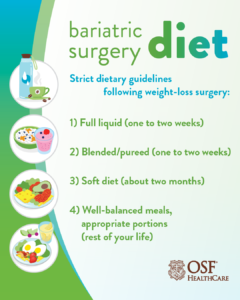
Disciplined diet before and after weight-loss surgery
The decision to undergo bariatric surgery isn’t easy. People suffering from obesity and its side effects (high blood pressure, diabetes, heart disease, etc.) come to this decision after years of struggling and failing to lose weight through diet and exercise.
Aside from choosing to undergo surgery after consulting with a physician, your biggest requirement is commitment to a lifestyle change of eating the right foods in the right portions, losing weight and keeping the weight off for the rest of your life. And that change must begin before surgery.
Pre-operation diet and weight loss
About three months before surgery, you’ll begin changing your diet in consultation with a dietitian and start losing weight. Depending on your weight, it may be recommended that you just lose 5-10 pounds, or you may need to lose up to 10% of your body weight if you’re extremely obese.
“The better you do in this stage, the better your chances of success after surgery,” said Lisa Micetich, a dietitian and manager of Food & Nutrition Services at OSF HealthCare Little Company of Mary Medical Center in Evergreen Park, Illinois. “As soon as you’ve made the decision to have surgery, you should start modifying your behavior. Honestly, 90% of the success a patient achieves depends on behavior modification. Surgeons get 10% of the credit, and the other 90% goes to the patient.”
The first step
The first step in healthier eating is cutting down to appropriate portion sizes and following the “MyPlate” concept. Under this formula, each plate of food is 30% non-starchy vegetables, 25% protein, 25% whole grains and 20% fruit. Meals should include:
- Lean protein: Chicken, fish, turkey, lean red meat, etc.
- Non-starchy vegetables (best prepared by steaming): Broccoli, carrots, green beans, squash, etc.
Foods to avoid:
- High-fat meats: Bacon, bologna, sausages, etc.
- Starchy vegetables: Corn, peas, potatoes, etc.
- Sugary beverages: Juice, soda, etc.
- Fast food and fried food
“Another key during this phase is the importance of ingraining physical activity into your daily routine,” Lisa said. “Even if it’s just going for a walk, people should get at least 30 minutes of physical activity per day.”
Full liquid diet
A week or two before surgery, you’ll switch to a low-sugar, low-fat, full-liquid diet (64 ounces per day) that’s high in protein and low in carbs. The protein will be important for healing and tissue repair after surgery, but there’s another reason for this step.
“The primary reason is to reduce the size of the liver so it’s easier to perform surgery,” Lisa said. “Fat and sugar increase the size of the liver. This can make it difficult for surgeons during bariatric surgery, which is performed laparoscopically through small incisions in the abdomen.”
Appropriate liquids are clear and include:
- Water
- Sugar-free, non-carbonated beverages (e.g., Crystal Light)
- Low-sodium broth
- Protein drinks (60-80 grams of protein per day)
- Sugar-free popsicles and gelatin
- Caffeine-free coffee and tea
Post-operation
After bariatric surgery, you have a reconstructed stomach with much less capacity, so it’s very important that you give it time to heal by eating the appropriate foods in the right portions. Doing this will also help you avoid complications, such as:
- Dumping syndrome: Occurs when the stomach empties food into the small intestine quicker than normal, causing symptoms such as nausea, abdominal cramping and diarrhea
- Constipation
- Dehydration
- Blocked stomach opening
- Weight gain and failure to lose weight
Step 1: Full liquid diet
The first diet step after surgery lasts one to two weeks and is the same liquid diet as before surgery.
Step 2: Blended or pureed diet
Step 2 also lasts one to two weeks and includes blended or pureed food that is high in protein and low in fat (no vegetables). This includes:
- Lean meats: Chicken, turkey, tuna, etc.
- Soft foods: Scrambled eggs, cottage cheese, Greek yogurt, etc.
“While the thought of eating blended or pureed food is hard for some people, patients have been on a liquid diet for so long by this point that they’re usually just happy to be getting solid food in their body,” Lisa said.
Also, even though the liquid diet step is over, it’s still important for you to maintain the commitment to drink 64 ounces of fluids per day to avoid dehydration (about 4 to 6 ounces of liquid every hour). This must be a lifelong commitment.
Step 3: Soft diet
Step 3 lasts up to three months. During this phase, you are able to eat the same foods as Step 2 but without the need for them to be blended or pureed. Additional foods include:
- Low-fat cheese; low-fat, low-sodium deli meats
- Refried beans; soft, cooked vegetables
- Natural applesauce, canned fruit (no sugar added)
Step 4: General diet
About three to four months after bariatric surgery, you are ready to begin the diet you should follow the rest of your life. The restrictions you faced during the first three steps are gone, but you should now focus on eating the right foods and the right portions.
“It’s important to eat protein at every meal and eat the majority of it first so you can meet your protein goals,” Lisa said. “In addition to helping with healing, protein preserves muscle mass, and it makes you feel full longer than carbohydrates.”
Every snack should also include protein, such as:
- Apple slices with peanut butter
- Blueberries and string cheese
- Crackers with string cheese
- Deli meat
- Nuts
Other keys to success
As you embark on this journey to a healthier future, there are other important rules to follow, including:
Are you a candidate?
- The “30-minute rule”: After surgery, you have a smaller stomach, so you should not drink any liquids for 30 minutes before a meal, during the meal, and for 30 minutes after a meal. Not drinking prevents you from feeling full too quickly before you’ve finished eating your protein. It also prevents liquid from pushing food through your stomach too quickly, which can cause you to overeat.
- Abstain from alcohol: Due to smaller stomach size after surgery, the body absorbs alcohol much more quickly, which means you can get intoxicated very quickly.
- Take vitamin and mineral supplements: You are at risk for low vitamin and mineral levels due to surgery as well as your reduced calorie intake, so supplements become necessary.
- Maintain a strong support system: This major lifestyle change can be very challenging, so it’s important that you surround yourself with people who will encourage you to stick with the program to ensure your success.
